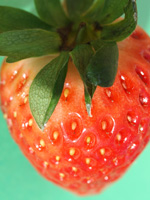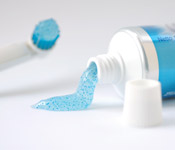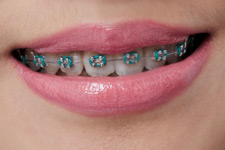It can be difficult to pin down what causes canker sores, which are painful outbreaks of ulcers on the tongue, inside lips or inner cheeks. The exact cause of this unfortunate but highly common condition remains uncertain but there is some evidence that for some people food allergies or sensitivities may be contributing factors, especially for those who experience frequent ulcers. Fortunately, this is one cause of canker sores that can be remedied easily, once you figure out what food or foods is triggering your outbreaks and remove the offender(s) from your diet.
 The tricky thing about allergies is that they can appear and disappear throughout your life. So while you may have grown out of that skin rash you used to get from eating strawberries it may return in the form of canker sores. Especially if you suffered from skin allergies, hay fever or hives as a child, you should consider food allergies as a possible cause of your canker sores.
The tricky thing about allergies is that they can appear and disappear throughout your life. So while you may have grown out of that skin rash you used to get from eating strawberries it may return in the form of canker sores. Especially if you suffered from skin allergies, hay fever or hives as a child, you should consider food allergies as a possible cause of your canker sores.
Gluten Intolerance
One common culprit in reoccurring mouth ulcers on the tongue and elsewhere is a gluten intolerance. Gluten refers to a group of proteins found in many grains. The list of gluten-containing food-items includes wheat, barley, rye, many types of breads, flour tortillas, cakes, crackers, pastries, cookies, doughnuts, pie, croissants, biscuits, pasta, noodles, buns, pizza crusts, oatmeal, muffins and so on. For some people gluten is more than a mere intolerance. A sensitivity to gluten may cause a serious condition called Celiac, a disease of the intestines that causes mal-absorption of nutrients. Celiac is also associated with outbreaks of canker sores.
Acidic Foods and Drinks
Acidic foods and drinks also tend to play a part in the development of mouth ulcers in some people. Frequent offenders include citrus fruits such as lemons, oranges and grapefruit, tomatoes, pineapples, and strawberries. Coffee, tea, soft drinks containing benzoic acid and vinegar-containing salad dressings may also be the underlying cause. Other common allergens such as cow’s milk, chocolate, cinnamon, walnuts and other nuts may also play a part in outbreaks for some people.
When a person has a food allergy, histamine is released and there are other immune system responses which may result in tissue damage, leading to canker sores in the form of an allergic reaction. In the case of acidic foods, it might be the very acidity causing irritation to the inside of the mouth. Canker sores on the tongue especially are a frequent result in those who are susceptible.
Some people also develop mouth ulcers after consuming hot or spicy foods. Spicy red pepper flakes, paprika, chili powder, and jalapenos can be highly irritating to the mucosa of your mouth.
How Do You Get a Canker Sore After Exposure to a Allergen Source?
Your immune system regards the food substance as foreign material which can be dangerous for your body and triggers a series of reactions to form immune cells against them, which release histamine. This can cause the clinical symptoms of inflammation, irritation and itching. However, in your fragile and sensitive oral cavity there can be direct cellular or tissue damage leading to the break-up of the intact skin which allows the oral ulcers to appear. The pain associated is due to the exposed free nerve endings of the skin which get damaged by slightest of physical or chemical insult.
What Can You Do to Prevent Mouth Ulcers
Many people with food allergies or sensitivities tend to get a burning or tingly sensation prior to the canker sore developing, which is a signal they have eaten something to which they are sensitive. If you suspect your canker sores are caused by a food allergy, try an elimination diet to pin down the offending food or foods. Now that you know the most common allergens, this should not be too difficult to figure out. However, it is by no mean an exhaustive list, as they could be many other possible offenders, depending on the individual. Most people find that once they remove the problematic food or foods from their diet, their canker sore outbreaks lessen or disappear.
Food Allergies vs Sensitivities
There is a difference between the two conditions thought they are often used interchangeably. A food allergy is body’s immune reaction against some specific proteins found in certain foods. The symptoms that may develop within minutes of even the tiniest consumption of the specific food or ingredient have the potential to cause life-threatening reaction (fortunately canker sores are not life-threatening, but they are painful). Most commonly seen food allergies are to eggs, milk, peanuts, shellfish or other seafood, soy, tree nuts, and wheat. These account for 90% of the food allergies in the various populations of the world.
On the contrary, food intolerance or sensitivity is rarely a risk for life and has no association with your immune system but instead with your digestive system. It manifests after consumption of larger amounts of food that is not friendly to your digestive apparatus. Most commonly, it is milk and milk products or gluten containing products to which the body shows intolerance.
Once you have determined what causes your canker sores, you can work on eliminating the trigger and hopefully minimize or even get rid of outbreaks. In the meantime on this site you will find a variety of treatments you can try at home to help soothe your sores.



